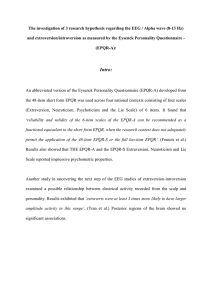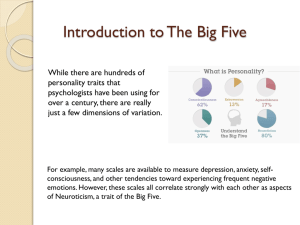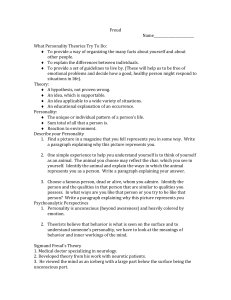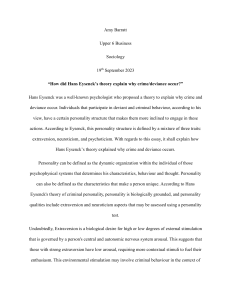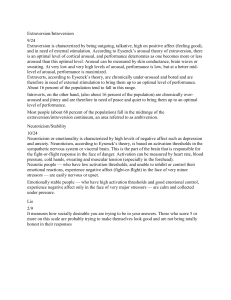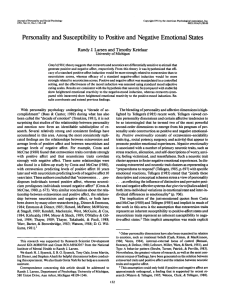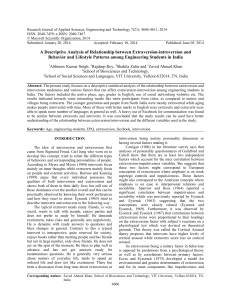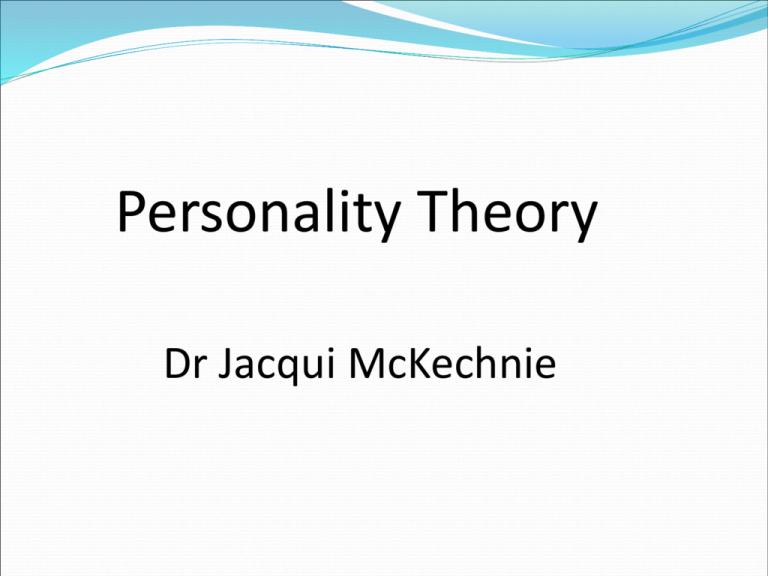
Personality Theory
Dr Jacqui McKechnie
Determinist - all thoughts and actions have a cause.
Personality is composed of:
primitive
id
biological drives
seeks immediate gratification
pleasure principle
ego
delays impulses
reality principle
mediates between id and
superego
superego conscience
judges actions
internalised morals
Sigmund Freud
1856 - 1939
Psycho sexual stages
Oral Stage (0 - 1yr)
Fixation
pleasure based on mouth
sarcastic
passive - sucking
alcoholic
active - biting
chain smoker
all id
Anal Stage (1 - 3yrs)
enjoys holding/expelling faeces
anal retentive
development of superego
anal expulsive
Phallic Stage (2 - 5yrs)
Pleasure from genitals
Oedipus complex - castration
Electra complex - penis envy
Overvalued penis - oversexed
men
Castrating females
Latency Period (6 - 12yrs)
Learn skills
Genital Period (puberty - adult)
pleasure from genitals
Ideal personality
Sexually mature
Defence Mechanisms
Strategies people use to reduce anxiety
Repression
Projection
Denial
Displacement
The desires of the id cannot be abolished and will be expressed
through dreams and Freudian slips.
Psychoanalysis – Pschodynamic Therapy
Hypnosis - not always successful
Free association - self-reports of memories
Analysis of resistance
Dream analysis - hidden symbolism usually erotic often
considered to be a disguised wish
Support for Freud
Klein (1882 - 1960)
Oral & anal personality exists
termed dependent and obsessional
Oedipus complex - children may have attraction to
opposite sex parent, but superego present before
Oedipus complex
Defence mechanisms - repression exists
Support for Freud
Sexual symbolism - widely found
Dream theory - dreams psychologically relevant
Fisher and Greenberg (1977)
Agree with Klein except for:
dreams are not a disguised wish
Psychoanalysis - difficult to show positive results
Neo-Freudians
Alfred Adler (1870 - 1937) Individual Psychology
An individual’s goals direct behaviour. Birth order.
Karen Horney (1885 - 1952) Social and Cultural Psychoanalyst
Less emphasis on sexual cause of neurosis and believed relationships
were important.
Erich Fromm (1900 - 1980) Humanistic Psychoanalyst Influenced by
Karl Marx and believed social, political, religious, economic and
cultural factors more important than biology.
Criticism of Freud
Popper (1959) - not testable, not scientific
No biological evidence of id, ego and superego
Limited sample - culturally specific evidence
Horney (1937) rejects penis envy, but agrees it may be a
metaphor for power. Womb envy.
Eysenck (1952) 7,000 neurotic patients
Psychoanalysis - 66% improved/cured
No treatment - 72% improved/cured
Eysenck’s Personality Theory
4 dimensions
•
Introversion/extraversion
•
Neuroticism/stability
•
Psychoticism/normality
•
Intelligence
Neuroticism
Neurotic
Extravert
Touchy
Restless
Moody
Neurotic
Introvert
Anxious
Rigid
Aggressive
Excitable
Sober
Pessimistic
Changeable
Impulsive
Reserved
Optimistic
Unsociable
Active
Extraversion
average
Introversion
Sociable
Quiet
Passive
Thoughtful
Peaceful
Careful
Outgoing
Talkative
Responsive
Easy going
Lively
Stable
Extravert
Controlled
Carefree
Leadership
Reliable
Calm
Stability
Stable
Introvert
Introverts - shy, prefer to work alone
Extraverts - sociable, prefer to work with others
Neurotic/unstable - moody, anxious, temperamental
Stable - calm, well-adjusted
These two dimensions are orthogonal - uncorrelated.
Psychotics - cruel, insensitive, make a fool of others.
Measure of Personality
Eysenck Personality Inventory (EPI)-57 items
•
•
widely used previously
lie scale
EPQ (1987) - 90 items includes psychoticism
Neurotic-extravert - prone to hysteria.
Neurotic-introvert - anxiety disorder or depression.
Although Grace and O’Brien (2003) depression +ve corr with
extraversion and neuroticism
Development of Personality
Biological Basis
Extraverts
•
low arousal level so they seek out stimulation
•
take longer to condition than introverts
•
less conscience about illegal acts
Introverts
•
highly aroused and arousable nervous systems
•
over-aroused and avoid additional stimulation
•
develop stronger consciences about illegal and
immoral acts
Neuroticism
•
increased autonomic nervous system (ANS)
activity
•
anxiety associated with ANS activity
Genetics
Personality test scores highly inherited.
Identical twins
Consistency Debate
Trait theorists - stable & enduring
Mischel (1968) - behaviour depends on situation
Bowers (1973) - interaction - personality traits and
situational circumstances
Cognitive Social Learning Theory - interaction between
individual differences and the environment
Criminal Personality
•
offenders - high for extraversion, neuroticism
psychotism
and
•
conscience is conditioned anxiety response & explains
link between extraversion, lack of conscience (psychopathy)
and criminality
Fox et al (2003) Guilt -ve correlation psychoticism
Goffman - criminality does not reside in individual
it is a label put on a sector of society
•
•
Criticisms of Eysenck’s Theory
How many traits are there?
Do traits exist at all?
Cattell (1965) 16 Personality Factors (16 PF test)
Consensus among trait theorists of 5 dimensions
Big Five
Openness
NEOAC
Neuroticism
Extraversion
Agreeableness
Conscientiousness


